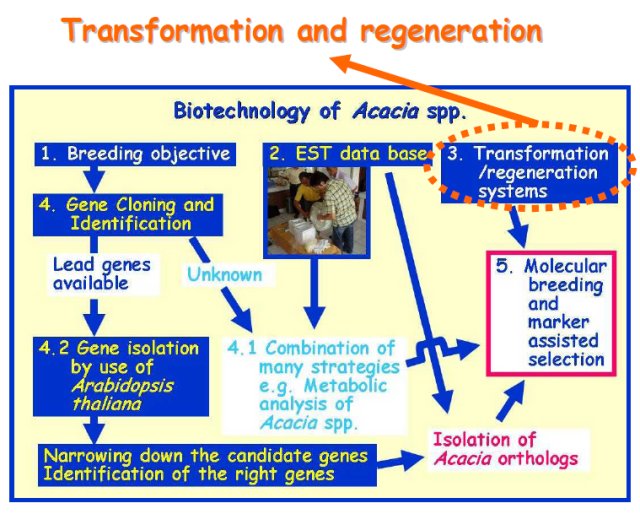
Regeneration and Genetic Transformation of Acacia Mangium
平成20 (2008) 年度ミッション専攻研究員
Mustafa Abul Kalam Azad (Ph. D.)
The global demand for wood products has been increasing year by year, while the natural forests are in short supply. Re-forestation is the solution to meet such increasing demands. Breeding efforts on this species are limited because of the long life cycle, and only seedlings obtained from some selected individuals are planted for the silviculture. To solve such breeding problems, it is now expected to utilize biotechnological approaches including transgenic technology. However, only a few studies have been conducted on this species as well as other species of the genus Acacia. The present research performs the experiments for establishing plant regeneration system on Acacia mangium and some other Acacia species, A. auriculiformis and hybrids (A. mangium × A. auriculiformis), as the basis for conducting the genetic transformation studies in the species of this genus. Molecular breeding based on genetic transformation of tree species can offer the possibility to introduce a particular phenotype without affecting the genetic background of a cultivar. Genetic transformation in Populus and Eucalyptus species enabled some success in modification of lignin contents. Traditional breeding has been less successful in getting disease resistance in A. mangium, most likely due to lack of such genes in the natural gene pool. Molecular breeding by introducing foreign disease resistance genes becomes an important option.
The precondition of molecular breeding of forest tree species can give the availability of a reliable and reproducible genetic transformation method, which in turn relies on a system of regeneration of one whole plant from a single cell.
The work carried out in this project should provide guidance for new procedures to introduce novel genetic characters, such as disease and insect resistance, into tropical trees. The development of transformation strategies will, therefore, also benefit to the basic knowledge of foreign gene expression in tropical trees.
|



